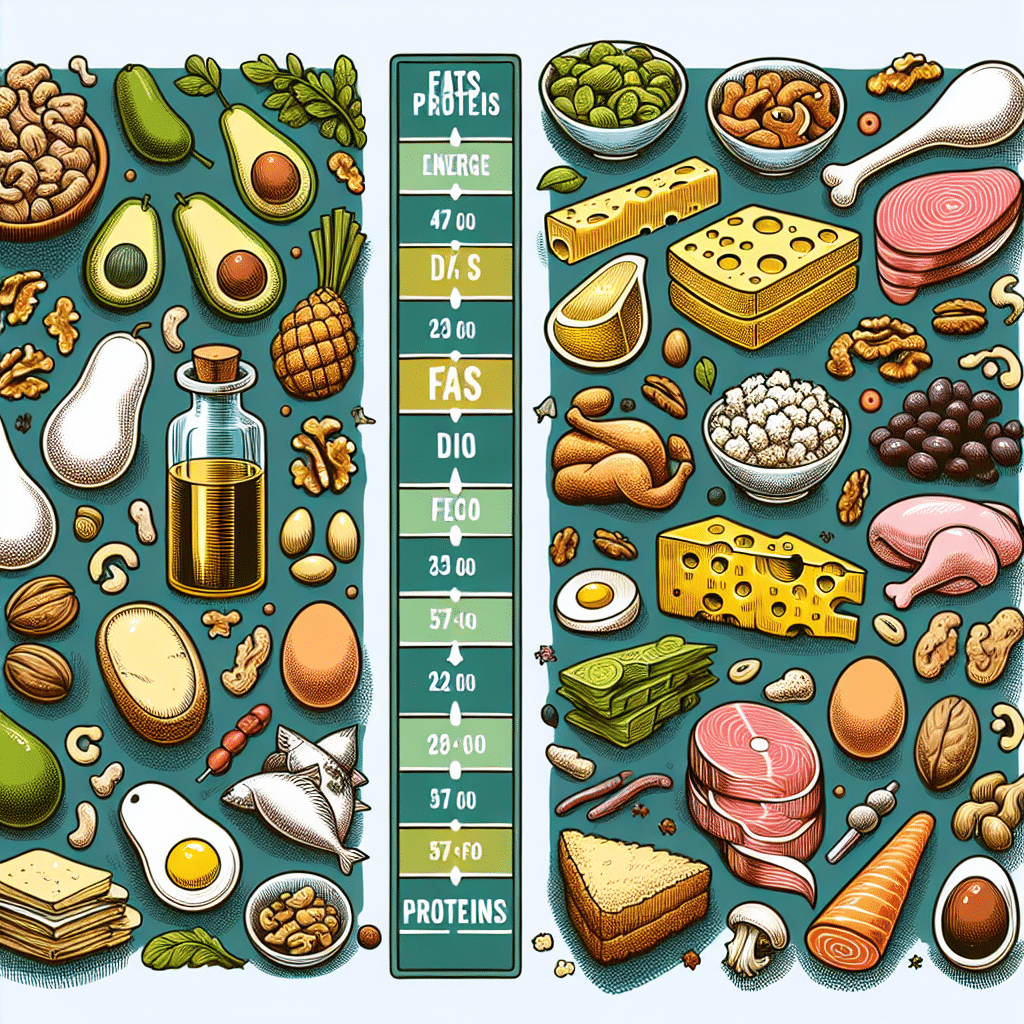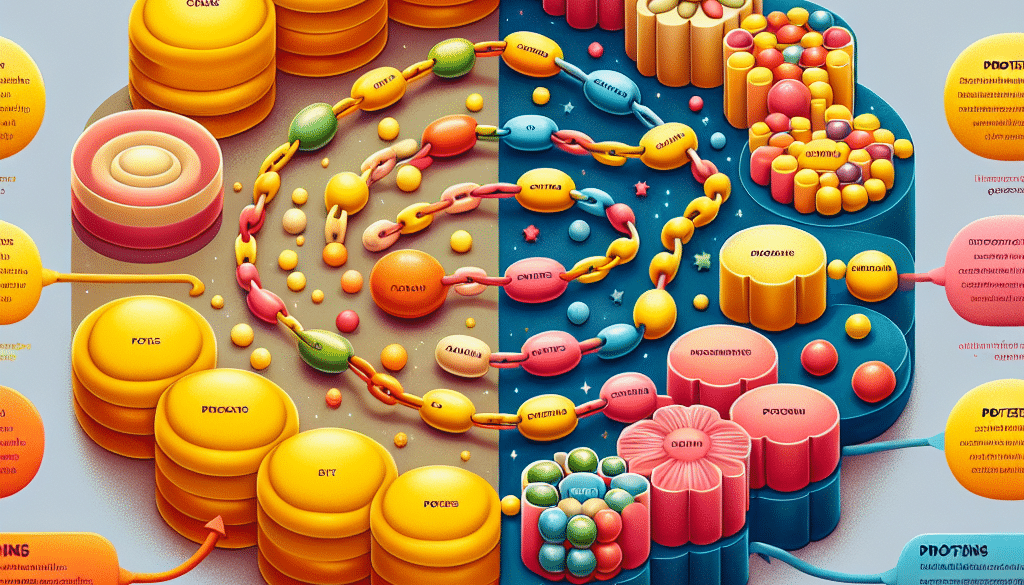Fats vs Proteins: Understanding the Differences
-
Table of Contents
Fats vs Proteins: Essential Nutrients in Focus

When it comes to understanding the building blocks of our diet, fats and proteins are two of the most discussed macronutrients. Both play crucial roles in maintaining a healthy body, but they serve different functions and have distinct properties. This article delves into the differences between fats and proteins, their importance, and how they impact our health.
Understanding Fats: Types and Functions
Fats, also known as lipids, are a diverse group of compounds that are insoluble in water. They are essential for various bodily functions, including energy storage, hormone production, and the absorption of fat-soluble vitamins (A, D, E, and K). There are several types of fats, each with unique characteristics and effects on health:
- Saturated Fats: Typically found in animal products and some plant oils, these fats are solid at room temperature. While they are necessary in moderation, excessive intake can raise LDL (bad) cholesterol levels and increase the risk of heart disease.
- Unsaturated Fats: These are generally liquid at room temperature and are found in plant oils, nuts, and fish. Unsaturated fats can be further divided into monounsaturated and polyunsaturated fats, which include omega-3 and omega-6 fatty acids. They are known to have heart-healthy effects.
- Trans Fats: Often found in processed foods, trans fats are created through hydrogenation. They can increase LDL cholesterol and lower HDL (good) cholesterol, contributing to heart disease.
Despite the negative reputation fats have garnered over the years, they are an indispensable part of a balanced diet. They provide a concentrated source of energy, with one gram of fat yielding about 9 calories, more than twice the energy provided by carbohydrates or proteins.
Proteins: Building Blocks of the Body
Proteins are large, complex molecules made up of amino acids, which are the fundamental building blocks of muscles, skin, enzymes, and hormones. They play a critical role in the growth, repair, and maintenance of body tissues. Unlike fats, proteins are not primarily used for energy; instead, they are essential for building and repairing tissues and supporting immune function.
There are 20 different amino acids that combine to form proteins, and nine of these are considered essential because the body cannot synthesize them. They must be obtained through diet. Protein sources can be categorized as either complete or incomplete:
- Complete Proteins: These contain all nine essential amino acids and are typically found in animal products, such as meat, dairy, and eggs, as well as in some plant-based sources like quinoa and soy.
- Incomplete Proteins: Plant-based proteins often lack one or more essential amino acids. However, by consuming a variety of plant-based protein sources, one can obtain all the essential amino acids over the course of the day.
Proteins are vital for the body’s metabolic processes, including the production of enzymes and hormones that regulate bodily functions. They also play a role in maintaining fluid balance and acid-base balance in the blood and bodily fluids.
Comparing Fats and Proteins: Dietary Balance
While both fats and proteins are essential, they should be consumed in the right balance to promote optimal health. The recommended dietary allowance (RDA) for protein is 0.8 grams per kilogram of body weight per day for adults, although this can vary based on age, sex, and level of physical activity. Fats should make up about 20-35% of total daily calories, with an emphasis on unsaturated fats.
It’s important to consider the quality of the fats and proteins consumed. For example, choosing lean proteins, such as chicken breast or legumes, and healthy fats, like those found in avocados or nuts, can have positive health outcomes. Conversely, a diet high in saturated fats and processed meats is associated with an increased risk of chronic diseases.
Impact on Health and Disease
The consumption of fats and proteins has been linked to various health outcomes. Diets high in saturated and trans fats have been associated with an increased risk of heart disease and stroke. On the other hand, diets rich in unsaturated fats, particularly omega-3 fatty acids, have been shown to have protective effects against heart disease.
Protein intake is not only crucial for muscle growth and repair but also for maintaining a healthy weight. Proteins have a higher thermic effect than fats, meaning they require more energy to metabolize, which can contribute to weight loss and management. Additionally, proteins can increase satiety, helping to reduce overall calorie intake.
Conclusion: Striking the Right Balance
Understanding the differences between fats and proteins is key to making informed dietary choices. Both macronutrients are essential for health, but they serve different purposes within the body. A balanced diet that includes a variety of fats and proteins can contribute to overall well-being and help prevent chronic diseases. It’s important to focus on the quality and quantity of these nutrients to maximize their health benefits.
Discover ETprotein’s High-Quality Protein Products
If you’re looking to enhance your diet with high-quality protein sources, consider ETprotein’s range of plant-based protein products. Their selection includes organic rice protein, clear rice protein, pea protein, and more, all characterized by a neutral taste and non-GMO, allergen-free attributes. Ideal for various industries, ETprotein’s products cater to the needs of nutraceutical, pharmaceutical, and food and beverage sectors, among others.
About ETprotein:
ETprotein, a reputable plant protein vegan protein Chinese factory manufacturer and supplier, is renowned for producing, stocking, exporting, and delivering the highest quality organic bulk vegan protein and plant proteins. They include Organic rice protein, clear rice protein, pea protein, clear pea protein, watermelon seed protein, pumpkin seed protein, sunflower seed protein, mung bean protein, peanut protein etc. Their offerings, characterized by a neutral taste, non-GMO, allergen-free attributes, cater to a diverse range of industries. They serve nutraceutical, pharmaceutical, cosmeceutical, veterinary, as well as food and beverage finished product distributors, traders, and manufacturers across Europe, USA, Canada, Australia, Thailand, Japan, Korea, Brazil, and Chile, among others.
ETprotein specialization includes exporting and delivering tailor-made protein powder and finished nutritional supplements. Their extensive product range covers sectors like Food and Beverage, Sports Nutrition, Weight Management, Dietary Supplements, Health and Wellness Products, and Infant Formula, ensuring comprehensive solutions to meet all your protein needs.
As a trusted company by leading global food and beverage brands and Fortune 500 companies, ETprotein reinforces China’s reputation in the global arena. For more information or to sample their products, please contact them and email sales(at)ETprotein.com today.












